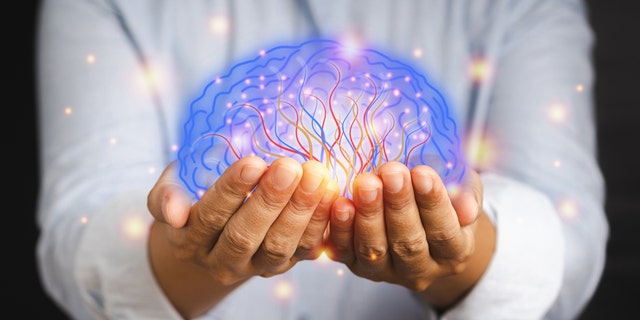
A new artificial intelligence-powered tool aims to detect signs of dementia, Alzheimer’s and other memory disorders by analyzing a person’s speech and language patterns.
The system is called CognoSpeak. Researchers at the University of Sheffield in the U.K. developed it.
In early trials that included both Alzheimer’s patients and cognitively heathy people, the tool showed 90% accuracy in identifying those with dementia — which is just as accurate as “pen-and-paper tests,” according to a press release announcing the new tool.
AI TOOL GIVES DOCTORS PERSONALIZED ALZHEIMER’S TREATMENT PLANS FOR DEMENTIA PATIENTS
The patient communicates with a “virtual agent” displayed via a web browser on a computer, laptop or tablet.
The virtual agent poses certain questions to patients — similar to the ones used to test memory skills during in-person consultations — and also asks them to describe pictures and test their verbal fluency.

A new artificial intelligence-powered tool aims to detect signs of dementia, Alzheimer’s and other memory disorders by analyzing a person’s speech and language patterns. (iStock)
At that point, CognoSpeak’s built-in AI technology analyzes the patient’s language and speech patterns to detect any cognitive warning signs.
Researchers next plan to test the tool on 700 participants from U.K. memory clinics, with funding provided by the National Institute for Health and Care Research.
The goal is for CognoSpeak to help enable faster diagnosis by serving as a “middle man” between the general practitioner and the dementia specialist.
“This tool could help patients start treatments sooner, reduce waiting times and give people certainty earlier.”
The physician would refer the patient to CognoSpeak and the test results would be routed back to the doctor — who would then decide whether the patient needed further memory care.
INTERNET USE BY SENIORS ON REGULAR BASIS COULD SLASH THEIR DEMENTIA RISK, STUDY SUGGESTS
“Waiting for a possible diagnosis of dementia can be a very anxious time for patients and their families,” said Dr. Dan Blackburn from the University of Sheffield’s Department of Neuroscience in the press release. “This tool could help patients start treatments sooner, reduce waiting times and give people certainty earlier.”
He added, “This would also free up clinicians’ valuable time and mean that those who need specialist care get access to it as quickly as possible.”
Connection between speech and dementia
One of the earliest symptoms of dementia is struggling to find words and pausing during speech, noted Dr. James Galvin, director of the Comprehensive Center for Brain Health at the University of Miami Miller School of Medicine, in a statement provided to Fox News Digital.
Galvin was not involved in CognoSpeak’s research or development.

The patient communicates with a “virtual agent” — which asks questions to test the person’s memory skills and cognitive fluency. (iStock)
“Using AI to analyze speech in the primary care setting could be a quick, reliable way to assess cognitive status, even if a person does not offer a memory complaint,” he said.
Dr. Michael Kleiman, PhD, a research assistant professor of neurology at the Comprehensive Center for Brain Health at the University of Miami Miller School of Medicine, is a colleague of Galvin’s who has studied the link between speech behavior and detection of early stages of cognitive impairment.
IOWA WOMAN, 27, HAS 99% CHANCE OF DEVELOPING DEMENTIA: ‘I NEEDED TO KNOW’
“Speech patterns in general are highly useful at identifying cognitive impairment, and some of the components of CognoSpeak, including picture descriptions, are frequently used by neuropsychologists and neurologists to assess and diagnose dementia,” Kleiman said. (He also has no affiliation with CognoSpeak.)
“If this tool is able to effectively process the speech data in an accurate and efficient manner, as well as keep patients engaged, we would expect that it would be useful for clinicians when assessing cognitive impairment,” he added.

Some 5.8 million people in the U.S. have Alzheimer’s disease and related dementias, according to the Centers for Disease Control and Prevention. (iStock)
As with all diseases, early detection is key, experts agree — which is why the speed of CognoSpeak could be beneficial.
“Given that Alzheimer’s disease and other dementias are progressive, it is important to catch these changes early in order to implement available interventions when they can be most effective to slow down cognitive decline,” Percy Griffin, PhD, the director of scientific engagement at the Alzheimer’s Association in Chicago, Illinois, said to Fox News Digital.
‘More work is needed’
While experts agree that the role of AI in neurology shows promise, more research is needed before it can be relied upon as a primary indicator.

While speech testing is useful, experts noted that it’s not the only component necessary for diagnosing dementia. (iStock)
“Although this technology is encouraging, more work is needed in larger, more representative study populations to further validate the utility of AI tools like this one in helping to diagnose Alzheimer’s,” said Griffin.
CLICK HERE TO SIGN UP FOR OUR HEALTH NEWSLETTER
“In the future, this could be another tool in the toolbox for early detection of Alzheimer’s,” he added.
And while speech testing is useful, experts noted that it’s not the only component necessary for diagnosing dementia.
“Other aspects of cognition — in particular, memory — and a detailed neurological examination must also be examined to establish a true diagnosis,” Kleiman said.

The physician would refer the patient to CognoSpeak and the test results would be routed back to the doctor — who would then decide whether the patient needed further memory care. (iStock)
Ideally, Percy added, the availability of non-invasive and potentially less expensive approaches to early detection and diagnosis — a combination of blood tests, simple digital tests and other tools — would make cognitive assessments available to more people.
CLICK HERE TO GET THE FOX NEWS APP
Around 5.8 million people in the U.S. have Alzheimer’s disease and related dementias, according to the Centers for Disease Control and Prevention (CDC).
The number of cases is expected to reach 14 million by 2060.

 Latest Breaking News Online News Portal
Latest Breaking News Online News Portal




